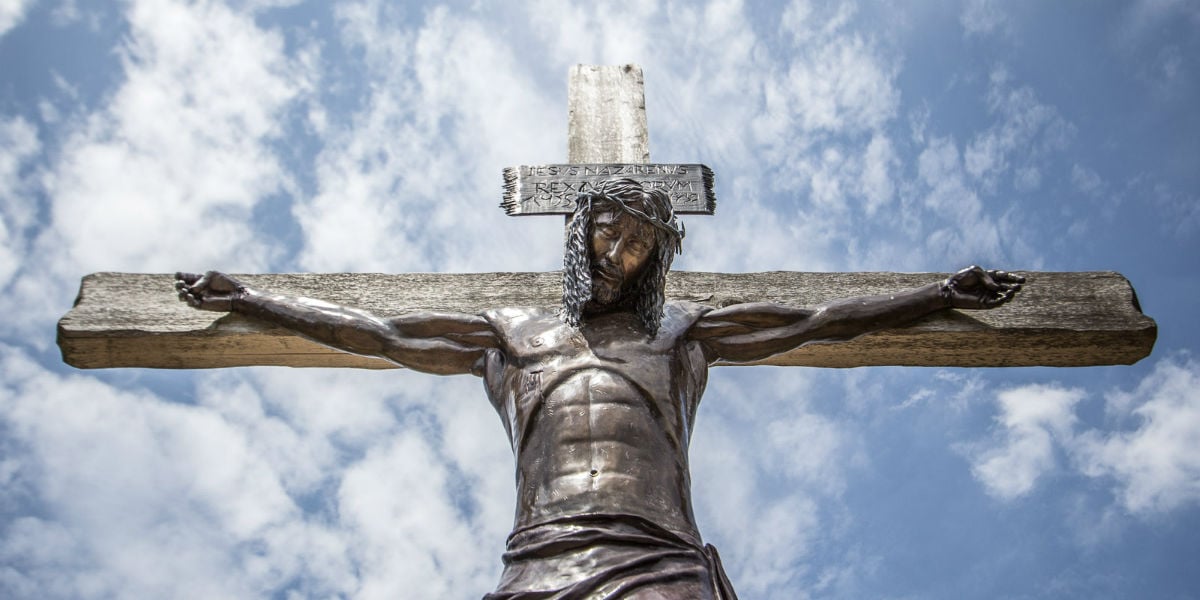By: Brian G. Chilton, Ph.D., M.Div. | April 7th, 2023
The seven last sayings of Jesus on the cross is very telling. Often, you can tell a lot about a person’s character by the last words said before they die. This is especially true of Jesus of Nazareth. This Good Friday and Easter is special for various reasons. On the one hand, the calendar matches the year AD 30 perfectly, one of the two proposed dates for Jesus’s crucifixion, death, and resurrection.1The years AD 30 and AD 33 are held to be the two most likely candidates. From my research, I personally hold that the year AD 33 better fits the year of Jesus’s death, burial, and resurrection than does its counterpart. Interestingly, this would place Friday, April 3, 33 AD as the actual date of Jesus’s crucifixion, and Sunday, April 5, 33 AD as the date of Jesus’s resurrection. While 2023 matches AD 30, the year 2026 perfectly matches AD 33, making Easter of 2026 a very special occasion. On this Good Friday, let us reflect on the seven last sayings that Jesus uttered from the cross and consider what each saying tells us about the character and compassion of Jesus.
Three periods of time are important to know concerning Jesus’s death. Jesus was nailed to the cross at 9 AM, darkness covered the region around noon, and Jesus died at 3 PM. The first three sayings from the cross were spoken before noon, whereas the last four statements were spoken near to the time of his death at 3 PM.
The First Saying on the Cross: A Word of Forgiveness
“Father, forgive them, because they do not know what they are doing” (Luke 23:34).2Unless otherwise noted, all quoted Scripture comes from the Christian Standard Bible (Nashville, TN: Holman, 2020).
The first statement shows the great love that Jesus even had for his enemies. In the Sermon on the Mount, Jesus told his disciples that they were to love their enemies. Jesus illustrated this principle on the cross. Jesus never instructs us to do something that he would not do himself. In this age of insults and aggression, we would all benefit from the love and compassion that Jesus demonstrated to those who nailed him upon the cross.
The Second Saying on the Cross: A Word of Promise
“Jesus, remember me when you come into your kingdom.” And he said to him, ‘Truly I tell you, today you will be with me in paradise” (Luke 23:43).
At least two criminals were crucified with Jesus. The number could have been more, but the Evangelists only tell us about two. While the other criminal joined the crowds to condemn Jesus, this criminal received Jesus as his Savior even in the last moments of his life. Jesus promised him a place in heaven. The pain of this man’s sin may have eclipsed the physical pain he suffered. Yet this day of agony would serve as a day of redemption, as Jesus promised this man a place in heaven with him that very day!
Several principles come out of this saying on the cross. First, when a person dies, they immediately enter into the presence of God. There is no delay. Jesus teaches an ongoing, spiritual existence that supersedes death. Second, God continues to reach out to a person throughout one’s life, even to the point of death. It is never too late to start a new relationship with Christ.
The Third Saying on the Cross: A Word of Protection
“When Jesus saw his mother and the disciple he loved standing there, he said to his mother, “Woman, here is your son.” Then he said to the disciple, “Here is your mother.” And from that hour the disciple took her into his home” (John 19:26-27).
Even while Jesus was on the cross, he was concerned about others. He made sure that his mother received the necessary care she needed from John his trusted disciple.
I fully admit that I am a mama’s boy. While I love my father, there is something special about a mother’s love. Jesus had a special relationship with his mother, Mary. Jesus and Mary had a bond that no one else could understand, especially given the manner in which Jesus was born.
In a time when widows and orphans were often mistreated and neglected, Jesus ensured that his mother received the care that she needed before his passing. Jesus trusted his disciple John, who was called “the disciple Jesus loved.” John was a very reliable soul. Even though he suffered the pangs of death which encroached his being, Jesus made sure that his mother found a home with someone who could be trusted. John was that person.
Do we care about others the way Jesus did? Or, are we consumed with the needs of the self, to the point that we neglect the needs of others?
The Fourth Saying on the Cross: A Word of Despair
“About three in the afternoon Jesus cried out with a loud voice, “Elí, Elí, lemá sabachtháni?” that is, “My God, my God, why have you abandoned me?” (Matthew 27:46).
The fourth saying is probably one of the most misunderstood of the seven sayings on the cross. Jesus quotes Psalm 22:1 in Aramaic. Psalm 22 is a psalm about despair and suffering. Most assuredly, Jesus experienced some sense of abandonment and despair. The weight of sin pressed upon his being, an experience he never had before being the sinless Lamb of God. This impacted his relational connectedness with the Father to some degree.3To what degree is a matter of theological inquiry.
Surely, Jesus felt abandoned. Most people had abandoned him. The majority of his disciples left him in his time of need, with the exception of John and the female disciples. The crowds that clamored around him when he miraculously fed and healed them were now absent, except for a few looking from afar with curiosity.
The first line points to the entire psalm.
As was the practice of the time, Jesus’s quotation of the first line of the psalm is an allusion to the entire work. The psalm ends with a glimmer of hope as it says, “All the ends of the earth will remember and turn to the Lord. All the families of the nations will bow down before you, for kingship belongs to the Lord; he rules the nations” (Ps. 22:27-28).
The psalm concludes by saying, “They will come and declare his righteousness; to a people yet to be born they will declare what he has done” (Psa. 22:31).
Though Jesus was in a great deal of despair, he did not lose hope in the Father’s plan. In many ways, we may go through a time of pain and sorrow. We may be tempted to lose sight of the Father’s purpose and plan. But like Jesus, never lose your hope even while traveling “through the darkest valley” (Psa. 23:4a). Remember, we have the continued hope that we should “fear no danger, for you are with me; your rod and your staff–they comfort me” (Psa. 23:4b).
The Fifth Saying on the Cross: A Word of Fulfillment
“After this, when Jesus knew that everything was now finished that the Scripture might be fulfilled, he said, ‘I’m thirsty’” (John 19:28).
The Greek word for “I thirst” is one word—dipso. Previously, Jesus had declined the soldier’s invitation to receive soured wine mixed with an anesthetic. Yet moments before his death, he accepted the invitation to receive the wine mixed with soured vinegar, so that he could speak the last words that needed to be proclaimed from the cross. His acceptance of the wine mixed with vinegar echoes Psalm 69:21. The psalm reads, “Instead, they gave me gall for my food, and for my thirst they gave me vinegar to drink” (Psa. 69:21).
Jesus stayed the course until the Scripture was fulfilled. He stayed true to the Father’s mission for his life, even to the last moments of his life. No matter what we go through in life, stay the course. Finish strong. Stay true to the Father’s plan.
The Sixth Saying on the Cross: A Word of Victory
“When Jesus had received the sour wine, he said, ‘It is finished.’ Then bowing his head, he gave up his spirit” (John 19:30).
The Greek word for “It is finished” is also one word—tetelestai. Jesus’s one-word statement was a sign of victory. The word in Aramaic could be mashelem, which incorporates the word shalom meaning peace. If so, Jesus’s proclamation of victory ultimately brings peace to those who believe in him. Jesus was victorious. Though Jesus’s death was sorrowful, he was victorious. That is why this tragic day is called “Good Friday.” Jesus defeated sin and the schemes of Satan. Good Friday is a day of victory.
The Seventh Saying on the Cross: A Word of Trust
“It was now about noon, and darkness came over the whole land until three, because the sun’s light failed. The curtain of the sanctuary was split down the middle. And Jesus called with a loud voice, ‘Father, into your hands I entrust my spirit.’ Saying this, he breathed his last” (Luke 23:44-46).
Jesus’s commitment to Scripture cannot be denied, especially in his seven sayings on the cross. Just as he had done previously, Jesus’s final word from the cross is a quotation of the psalms. This time, he quotes Psalm 31:5 which says, “Into your hand I entrust my spirit; you have redeemed me, Lord, God of truth” (Ps. 31:5). The psalm speaks of trusting God even in the most frightening of experiences.
Even as Jesus breathed his last, he trusted the Father’s plan. His trust was well placed because the Father proved his faithfulness on Easter Sunday. While everything was grim and gloomy on Friday afternoon, the blessed promise was that Sunday was on its way. We may experience our own Fridays of gloom. Jesus reminds us that we must keep trusting in God because our Sunday is also on its way.
The psalm speaks of trusting God even in the most frightening of experiences. Even as Jesus breathed his last, he trusted the Father’s plan. His trust was well placed because the Father proved his faithfulness on Easter Sunday.
Conclusion of the Seven Last Sayings on the Cross
The seven sayings on the cross afford a glimpse into the character of Jesus. These seven sayings on the cross tell us about the compassion, the faith, and the determination of Jesus. Even though he was the Son of God, the human personality and character of Jesus are admirable to all.
Furthermore, the seven sayings on the cross when meshed with the glories of Easter Sunday grant a powerful spiritual application. While everything was grim and gloomy on Friday afternoon, the blessed promise was that Sunday was on its way. We may experience our own Fridays of gloom. Jesus reminds us that we must keep trusting in God because our Sunday is on its way. The world is in a state of turmoil. Nations threaten others with aggression. Sickness and disease seems to increase with each passing year. The world is indeed in a deep state of darkness. Yet, take heart, Sunday is on its way. Sunday–a day of resurrection, restoration, and peace–may seem so far away. But it may be nearer than we think. For on that day, as Paul reminds us,“For the Lord himself will descend from heaven with a shout, with the archangel’s voice, and with the trumpet of God, and the dead in Christ will rise first. Then we who are still alive, who are left, will be caught up together with them in the clouds to meet the Lord in the air, and so we will always be with the Lord” (1 Thess. 4:16-18).
About the Author

Brian G. Chilton earned his Doctor of Philosophy in the Theology and Apologetics program at Liberty University. He is the host of The Bellator Christi Podcast and the founder of Bellator Christi. Brian received his Master of Divinity in Theology from Liberty University (with high distinction); his Bachelor of Science in Religious Studies and Philosophy from Gardner-Webb University (with honors); and earned a Certificate in Christian Apologetics from Biola University. Also, he is enrolled in Clinical Pastoral Education to better learn how to empower those around him. Brian is a member of the Evangelical Theological Society and the Evangelical Philosophical Society. Brian has served in pastoral ministry for nearly 20 years and currently serves as a clinical hospice chaplain and serves as an interim pastor in northwestern North Carolina.
https://www.amazon.com/Laymans-Manual-Christian-Apologetics-Essentials/dp/1532697104
If you enjoyed this article, consider reading the following article by this author: https://bellatorchristi.com/2022/04/16/4-new-arguments-for-the-resurrection-of-jesus/
Copyright, 2023. Bellator Christi.
Notes
- 1The years AD 30 and AD 33 are held to be the two most likely candidates. From my research, I personally hold that the year AD 33 better fits the year of Jesus’s death, burial, and resurrection than does its counterpart. Interestingly, this would place Friday, April 3, 33 AD as the actual date of Jesus’s crucifixion, and Sunday, April 5, 33 AD as the date of Jesus’s resurrection. While 2023 matches AD 30, the year 2026 perfectly matches AD 33, making Easter of 2026 a very special occasion.
- 2Unless otherwise noted, all quoted Scripture comes from the Christian Standard Bible (Nashville, TN: Holman, 2020).
- 3To what degree is a matter of theological inquiry.





